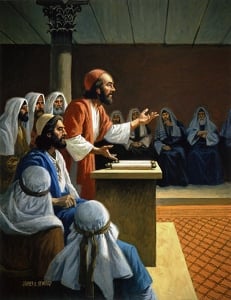The Controversy – Hit the Mark
- Who controls the church? That is a question that is as relevant today as it was during the time of the early church. This week as we discuss The Controversy, in addition to examining what, we will also look at why. Why was there a controversy that was threatening to split the early church?

Image © Lifeway Collection from GoodSalt.com
In Acts 15 we get a clear picture of what the controversy was.
“And certain men which came down from Judaea taught the brethren, and said, Except ye be circumcised after the manner of Moses, ye cannot be saved.” Acts 15:1
The argument being proposed was not based out of a scriptural dispute, but rather out of a narrow-mindedness that was seeking for control and influence over the church.
That same sentiment Jesus often confronted. On one occasion the Pharisees turned their criticism on the disciples for not performing the ceremonial washing before eating. Listen to the response of Jesus:
He answered and said to them, “Well did Isaiah prophesy of you hypocrites, as it is written:
‘This people honors Me with their lips,
But their heart is far from Me.
And in vain they worship Me,
Teaching as doctrines the commandments of men.’For laying aside the commandment of God, you hold the tradition of men —the washing of pitchers and cups, and many other such things you do.”
He said to them, “All too well you reject the commandment of God, that you may keep your tradition. Mark 7:6-9
Hard-heartedness, fear, bigotry, exclusiveness, and pride disguised as righteousness will always be in opposition to the ways of God. It was so in the early church.
As the early church was growing, some of the Jews feared that their distinctiveness as a people would be evaporated. In their minds, what made them special above all people – being the offspring of Abraham, signified by circumcision – was being forgotten with the influx of Gentile believers. Convincing the members to submit to circumcision and adoption of ceremonial laws would allow them to gain influence and control.
This crisis was met by the brethren gathering together and prayerfully considering the matter. It was clear that God was leading and blessing the church and to hold onto the past would be a mistake.
Writing a letter to the churches expressing the unity of those gathered and the conclusions they reached, the tone and direction was set for how the church would progress.
“Greetings.
Since we have heard that some who went out from us have troubled you with words, unsettling your souls, saying, “You must be circumcised and keep the law”—to whom we gave no such commandment— it seemed good to us, being assembled with one accord, to send chosen men to you with our beloved Barnabas and Paul, men who have risked their lives for the name of our Lord Jesus Christ. We have therefore sent Judas and Silas, who will also report the same things by word of mouth. For it seemed good to the Holy Spirit, and to us, to lay upon you no greater burden than these necessary things: that you abstain from things offered to idols, from blood, from things strangled, and from sexual immorality. If you keep yourselves from these, you will do well.” Acts 15:23-29
While taking into consideration legitimate concerns, the brethren, in unity, decided on a course of action that allowed for diversity of practice and moved forward. The past was the past. It was time for the early church to advance.
The church is ever advancing. But as we do, our source of clarity and mission must always be the Word of God. Hard-heartedness, fear, bigotry, exclusiveness, and pride are still often found at odds with the advancement of the church. They are often disguised as zealous arguments over the purity of the church while really they are about who controls the church.
As we look back over the course of history, we see many challenges to the church. Over and over again a crisis has hit the church. It often appeared that things were hopeless and that the church would be defeated. It was not.
Although often encumbered and slowed down by plans of the Enemy, God’s church prevails. For each crisis, God provides a solution. For each question that would divide us, God has an answer. Our challenge is to submit everything to the Word of God. Not just our doctrinal positions but our hearts and our lives.
Who controls the church? If our answer is God, then God must control us, because we are the church. Does He?
Here are a few Hit the Mark questions for this week’s lesson discussion:
- What does “control” mean to you?
- Do you believe that God is or is not in control of the church? Explain your answer.
- If the Bible is our guide, why is there so much controversy over our positions?
- What should be our attitude if the church goes against something we closely believe?
- Is it acceptable to challenge the direction of the church and if so, how? If not, why not?
- What is the difference between a principle and a tradition?
- Is the following statement True, Mostly True, Somewhat True or Not True: Our traditions as a church come from God and should be preserved as much as possible. Explain your answer.
We close this week’s lesson with a promise from Jesus. It implies that our motives make the difference.
“Jesus answered them and said, “My doctrine is not Mine, but His who sent Me. If anyone wills to do His will, he shall know concerning the doctrine, whether it is from God or whether I speak on My own authority.” John 7:16-17
Until next week, let’s all continue to Hit the Mark in Sabbath School!
